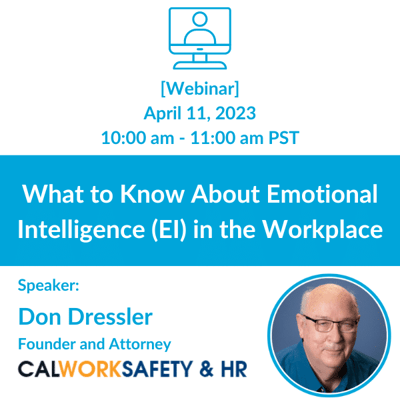The Value of Emotional Intelligence (EI) in the Workplace
March 20th, 2023 | 5 min. read

Surely, you have an understanding of the Intelligence Quotient, commonly referred to as IQ.
Because accomplished figures like Albert Einstein and Sir Isaac Newton are memorialized for their intelligence, having a high IQ has become associated with ability and success.
What would you say if I told you that IQ is not the predominant factor of either? Rather, studies show that Emotional Intelligence (EI) plays a much larger role in both than IQ.
According to a 40-year study of PhDs at UC Berkeley, EI is 400% more effective at predicting professional capability than IQ. And, of 34 critical workplace skills, a recent TalentSmart survey found EI to be the strongest predictor of success in all job types.
As an employer, your ultimate goal is to hire a high-performing team. Given statistic after statistic validating Emotional Intelligence (EI) as a key characteristic of top performers, you may be curious to learn more about EI.
So, what is EI? And how does it impact your business?
These are the questions our HR specialists, here at Combined, are prepared to answer. Having assisted many employers with their hiring and training process, our HR team recognizes not only the importance of EI in the workplace but also its correlation to better business practices.
In this article, we will discuss the essential elements of Emotional Intelligence (EI). By reading it, you will learn why EI is a valuable aptitude to cultivate in the workplace.
What is Emotional Intelligence (EI)?
Emotional intelligence (EI) is the ability to intuitively navigate emotions in day-to-day situations.
This may sound simple enough, but it is actually an intricate process that requires you to:
- Recognize and understand your own emotions
- Recognize and understand the emotions of others
- Manage how your emotions drive your behavior
- Perceive when and how others’ emotions drive their behavior
- Acknowledge how your behavior affects others and how others’ behavior affects you
- Use this awareness to navigate relationships appropriately and constructively
To better understand EI, first consider the range of emotions you experience every day:
From the annoyance that arises when your alarm clock sounds and you can't afford to hit snooze again, to the happiness that floods in as you take the first sip of your morning coffee, or the anger that takes over when unexpected traffic makes you late for work. You might feel pride if your boss acknowledges your hard work, frustration when technology hinders you from meeting daily goals, or excitement to clock out at the end of a long, emotionally charged day and return home…where, you'll likely experience even more emotions.
Now, consider how you respond to each of these emotions:
Do you throw your alarm clock at the wall and go back to sleep? Or do you take a few deep breaths and mentally prepare yourself to tackle the day?
Do you graciously accept recognition from your boss and let it motivate you to continue to perform well? Or do you gloat incessantly about your success to your coworkers?
Finally, consider the emotional ups and downs that every person you interact with is also experiencing and reacting to:
What are they feeling?
- Annoyance?
- Happiness?
- Anger?
- Pride?
- Frustration?
- Excitement?
What do you notice about these emotions?
Yes, they are the same as the emotions that I previously suggested you may feel on a day-to-day basis. (And yes, this comparison is intentional).
Because the emotions that you experience and how you react to them qualify you to understand the similar emotions that others feel and how they react to them. While you may not know why they are feeling a certain way, you can certainly relate to what they are feeling and how it is affecting their behavior.
Emotional intelligence (EI) is the ability to harness your understanding of experiencing emotions and apply it as a tool to engage with others in a way that shows empathy. It equips you to manage your interactions with others, by gauging the right response, at the right time, with the right person, so you can build better relationships.
The 4 domains of Emotional Intelligence (EI)
Emotional Intelligence (EI) is comprised of a set of 4 nuanced, soft skills. These 4 skills – self-awareness, self-management, social awareness, and relationship management – make up the 4 domains of EI.
Collectively these attributes contribute to high EI expression.
Let's take a closer look at each of them.
1. Self-awareness
Self-awareness is defined by a deep understanding of yourself:
- Your emotions
- Your thoughts and behaviors
- Your strengths and weaknesses
- Your values, beliefs, and personality traits
Being self-aware allows you to compare outside perspectives to your own and use this understanding to communicate effectively. Self-awareness is often associated with the ability to make meaningful connections and retain healthy relationships.
For this reason, strength in collaboration is a key skill stemming from self-awareness.
2. Self-management
Self-management refers to your ability to regulate and control your emotions, moods, and impulses appropriately. Self-management means knowing how to behave in different situations in order to accomplish your personal and professional goals. Self-management competency leads to being self-motivated, goal-oriented, and adaptable.
Consequently, self-management corresponds to the key skill of initiative.
3. Social awareness
I’m sure you’ve heard the expression, “Put yourself in someone else’s shoes.” This concept of viewing a situation from another point of view is reflective of social awareness. Social awareness is your ability to understand and empathize with the emotions and perspectives of others.
|
It involves first evaluating situations by:
Then, mediating situations by:
|
Empathy, then, is a key skill derived from social awareness.
4. Relationship management
Relationship management refers to your competency in building and maintaining healthy relationships. It is developed through trust, transparency, and accountability – the more reliable you are, the easier it is to establish good rapport with others.
Being able to effectively manage relationships usually indicates proficiency in leading conflict resolution and solving problems.
Thus, relationship management develops the key skill of leadership.
The value of Emotional Intelligence (EI) in the workplace
Now that you understand what Emotional Intelligence (EI) is and its components, let’s think about why EI is important in the workplace.
To do this, let’s first review the key skills associated with the 4 domains of EI:
- Self-awareness: Collaboration
- Self-management: Initiative
- Social awareness: Empathy
- Relationship management: Leadership
Now, let’s think about what an employee with each key skill lends to the workplace:
- Collaboration: Can work well with others and prioritize team goals
- Initiative: Can complete tasks, solve problems, and manage time independently
- Empathy: Can communicate exceptionally well and easily develop strong relationships with coworkers, customers, and clients
- Leadership: Can motivate, inspire, and unite a team to improve productivity
Finally, combine them – what do you have?
An employee that can motivate, inspire and work well with others to unite a team. Who prioritizes team goals and communicates exceptionally well but is also able to complete tasks, solve problems, and manage time independently. Who has a knack for easily developing relationships with coworkers, customers, and clients and, because of it, helps improve productivity.
This description is developed comprehensively from the workplace skills linked with each of the 4 domains of EI. Therefore, it is an example of an employee, competent in all 4 domains, with high EI. And, according to The Nth Degree Magazine, this description encompasses all 5 of the top skills employers look for when hiring.
This should tell you that employees with high EI bring a desirable skill set to the workplace that enables them to perform remarkably well.
With this in mind, it shouldn’t be surprising that 90% of the top performers across all job types have high EI – making EI not only a valuable at-work aptitude but an important attribute to cultivate in the workplace.
For guidance on how to proactively train your workforce to enhance and express EI on the job, read 5 Techniques to Improve Emotional Intelligence (EI) in the Workplace
Next steps to improving workplace Emotional Intelligence (EI)
If you are here, you have heard of Emotional Intelligence (EI) but were curious about why EI is trending among employers as a must-have skill.
In this article, you learned what EI is and why it is so valuable to the workplace.
Do you want to better your business with a focus on EI? Here at Combined, our HR team can provide you with the resources you need to do just that.

|
Want more information about Emotional Intelligence in the Workplace?Join the webinar to learn more. |
This article is not intended to be exhaustive nor should any discussion or opinions be construed as legal advice. Readers should contact legal counsel for legal advice.
Topics:
.png?width=1125&height=426&name=Your%20paragraph%20text%20(5).png)
